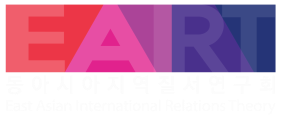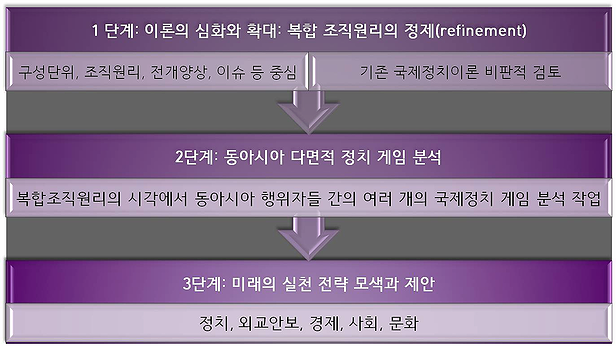|
1년차: 이론의 심화와 확대: 복합조직원리의 정제(refinement) 먼저 1단계, 1년차 연구는 동아시아 국제정치이론을 본격적으로 수립하기 위해 필요한 요소들을 토론해 본다. 구체적으로, 복합조직원리의 근간인 인식, 조직원리, 단위, 전개 양상, 이슈 등을 중심으로 복합조직원리의 시각을 보다 정제화시키는데 초점을 맞출 것이다. 동아시아 국제정치이론의 주요 요소가 되는 조직원리의 변화 과정, 여러조직들간의 복합 과정, 그 속에서 개별 현상들이 일어나는 맥락 등을 살펴보고 이를 통하여 복합조직원리를 새롭게 정제한다. 즉, 조직원리들 간의 복합 과정과 개별 현상들이 일어나는 맥락을 살펴 볼 것이다. 이는 단순한 이론적 작업이 아니라 현재 동아시아에서 벌어지고 있는 많은 변화들, 예를 들어 중국의 부상, 미국 패권의 상대적 쇠퇴, 동아시아의 구조적 세력전이 현상, 지역주의와 다자주의의 발전과정, 동아시아 정체성의 다양화, 동아시아 공동체론의 대두와 변형, 자유무역협정을 비롯한 경제현실의 복잡화와 안보, 경제관계의 다기화 등의 현실을 이론적으로 살펴보는 작업이 될 것이다. 2년차: 동아시아 다면적 국제정치 게임의 분석 1단계 2년차 연구에서는 복합조직원리의 시각에서 동아시아 행위자들 간에 일어나는 여러 개의 국제정치 게임을 분석하는 작업을 시도할 것이다. 앞서 가정한 대로 네 시대의 조직원리들이 서로 다른 이슈들에서 다른 형태의 효과를 나타내고 있다. 즉, 다층적 권력 장 속에서 동아시아의 행위자들은 여러 개의 국제정치 게임을 동시적으로 진행하고 있는 것이다. 한 이슈에서의 국제정치가 시간이 흐름에 따라 서로 다른 조직원리의 게임으로 변환하기 때문에, 각 행위자들은 이들을 미리 고려한 복합적인 게임 전략을 구상해 놓을 필요가 있다. 어떤 조건에서 어떤 순서로 각 게임이 전개 될지는 매우 알기 어렵고, 각 이슈별로 그러한 전개의 양상 또한 다르다고 볼 수 있다. 이들을 선험적으로 미리 규정할 수 없기 때문에 각각의 패턴을 찾아가는 것이 최대한 일 것이며 경험적 연구의 대상이 된다. 3년차: 미래의 실천 전략 모색과 제안 21세기 국제정치가 지구적으로 급변하고 있는 상황에서 동아시아의 국제정치이론화는 학문적 측면 뿐 아니라, 실천적 측면에서도 매우 중요한 함의를 가진다. 현재 국제정치는 국가주권과 무정부상태라는 조직원리를 넘어서서 단위의 다차원화와 네트워크적 거버넌스라는 새로운 조직원리를 내포하게 되었다면 중세에서 근대로 이행했던 과거의 거대 이행의 시점, 유럽 이외 지역이 유럽기원의 근대국제정치로 포섭되는 과정, 그리하여 시공적으로 하나의 근대국제정치가 만들어지는 과정에 대한 전반적인 관점이 필요하게 된다. 만약 20세기 중후반의 경험에 기초하여 과거와 미래를 일방적으로 재단하고, 서구의 국제정치경험으로 비서구 지역의 현상을 설명하려고 하면 소위 역사-장소의 물신화 경향에 빠질 수밖에 없다. 이는 현재중심주의, 서구중심주의라는 경직된 이론적 틀을 생산하고 다른 시대와 다른 지역에 대한 설명력을 잃게 되는 결과를 낳게 된다. 이러한 상황에서 조직원리의 변화 과정을 철저히 분석할 필요가 있다. First Year: Development and expansion of theory: Refinement of complex organizing principles
In the first year, we consider the building blocks that will be put together to construct our theory. We look at perception, organizing principle, unit, dynamics, and issues to refine the pieces for a coherent framework. How do we conceptualize each organizing principle and its relation to others, in terms of overlap or co-existence? Answering this question will involve looking at rise of China, relative decline of the US, structural power transition in the region, development of regionalism and multilateralism, diversification of East Asian identities, and the rise and transformation of discussion of East Asian community. Second Year: Analysis of multi-layered international political games in East Asia We will try to analyze multiple international political games at work between actors in East Asia from the perspective of complex organizing principles. While traditional, Modern, Modern-transitional, and Post-modern time periods coexist, they exert different kind and degree of effect on different games in the region. How do the rules of the game in one issue change to that of another time period and how do we theorize and predict such transitions? Answers to this question require empirical research on patterns of games. Third Year: Practical Strategies and Policy Implications If multiple organizing principles and rules of the game are at work in East Asia, it would be a mistake to develop national strategies based on a narrow understanding that is limited to one or few principles. In this vein, theorizing EAIR in such a complex way will draw crucial implications in practical sense. This perspective will help us tackle Western-centric and ahistorical biases that may be hidden in our current understanding of EAIR and develop proper policy implications for countries in the region. |




